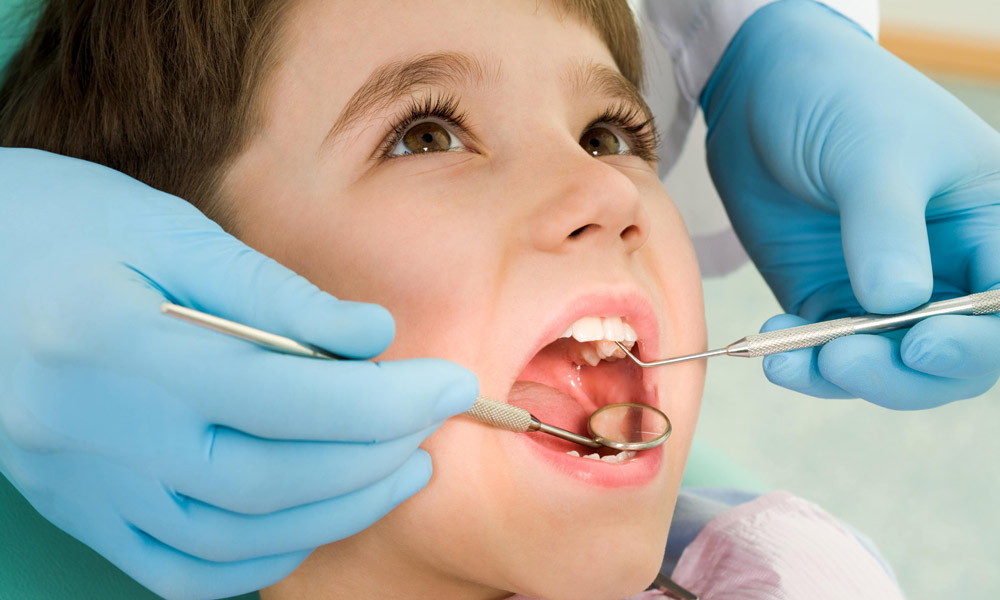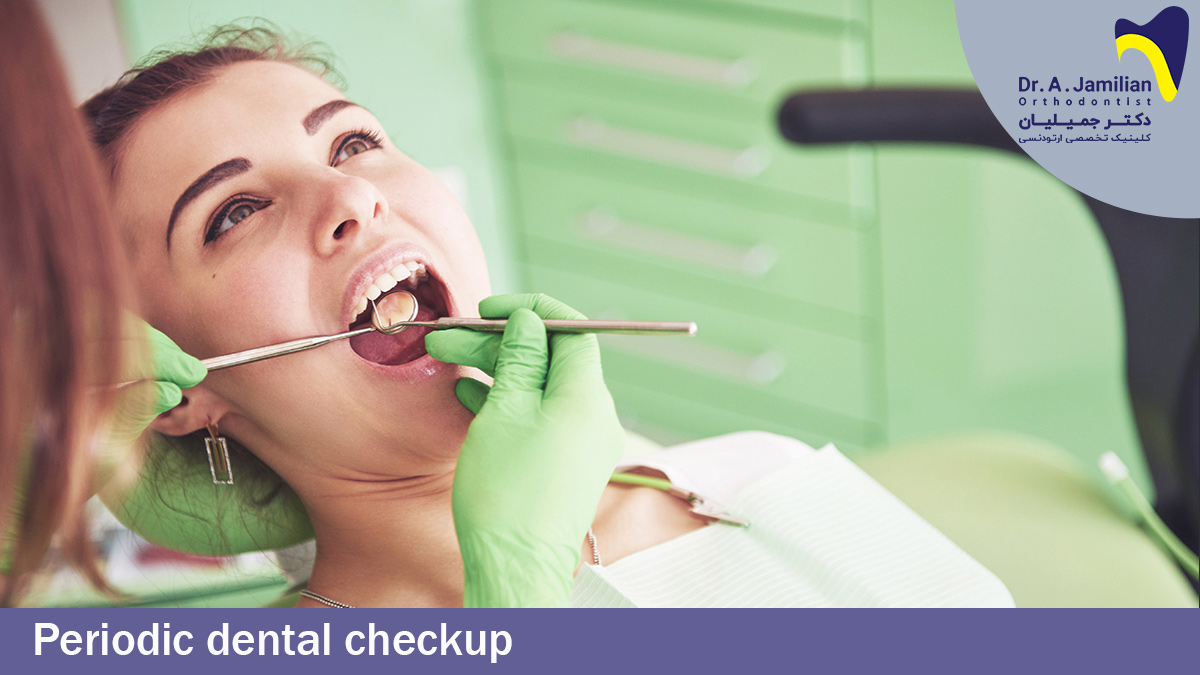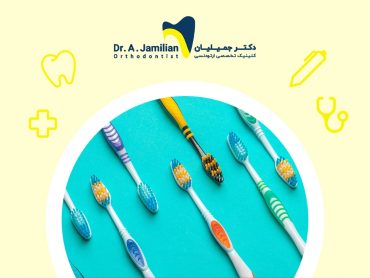It’s no secret that check ups are important. It all starts with the child’s first visit to the doctor, which makes it very important. Compensating for the child’s possible stress and fear will be difficult and their effects will remain until death, and if there is a friendly relationship between the doctor and the child, it’s effects will remain until adulthood. Parents should consider the following points in periodic dental checkups:
- Choose a dentist who has enough patience and time for your child and whom you trust personally.
- Avoid stating technical and medical facts. The child doesn’t understand concepts such as dental infection, tooth decay, tooth extraction, or others, and stating such points only serves to stress the child. You only have to tell the child that seeing the dentist is necessary to make the mouth more beautiful and smell nice, and leave the technical statements to the dentist and the clinic staff.
- Don’t promise your children rewards or anything else for visiting the dentist. These promises will make your child see such visits as unpleasant. The child knows that you never make such promises for going to enjoyable places, like parks.
- Parents who are themselves stressful will transfer this stress to the child. Never talk about medical and dental issues in front of your children.
- Ask your children to pay attention while visiting a doctor and to paint the dentist after returning home. Then ask them to paint the brush, toothpaste, and other things. Painting helps the child connect with an environment.
- If the child doesn’t allow you to easily see their teeth, you can play with your child and examine the mouths of their toys and teach many positive things to your child while playing.
- Let children enter the clinic on their own foot to give them more self-confidence. Hugging and kissing your child repeatedly won’t help.
- Never tell the dentist how to receive your child. Every dentist knows how to treat children, and you will only irritate the dentist and stress your child. Always act in a manner that your dentist asks you to. If your dentist asks for your help in examination, oblige them. Otherwise, stay in the waiting room. However, if it is something important, don’t hesitate to tell them.
- If you want to disclose something related to the treatment or your child’s medical and orthodontic issues with the dentist, talk to the dentist in private and not with the child present.
- Leave the selection of the treatment method and stages to the dentist. In the initial sessions, it is preferable to perform painless treatments for the child.

Dental checkup for minors is recommended at least once a year. All in all, children should be taken to the dentist at the age of 1 (6 months after the eruption of the first milk tooth).In 2-3 years of age, start to visit the dentist regularly.
Adults periodic dental checkups
Consider the following points if you are anxious about visiting the dentist: It’s better to inform the dentist about your anxiety and stress, as this lets them choose the treatment suitable to you and prescribe drugs to reduce your stress. Additionally, try to choose a time for going to the dentist when you’re free to remove unnecessary hassle & strain. People often choose holidays or the early hours of the day.
During the dentist’s treatment, try to be in a position from which to see your image as you are resting on the seat. (If there is a camera and monitor installed on the dental unit.) If the dental drilling noise irritates you, bring a portable music player with headphones and listen to your favorite music during treatment.
The presence of a family member or a friend can sometimes be relaxing and give you a peace of mind. In order to have no pain during anesthesia, the dentist anesthetizes the area of injection with anesthetic gel or spray in cotton.
For adults, dentists throughout the world recommend periodic dental checkup every 6 months to examine the gum and the teeth. Not only does this prevent a high percentage of malocussions but, allows the dentist to have more control over the patient’s teeth.
In general, all individuals with high risk of tooth decay should visit the dentist once every 3 or 4 months, and lower risk patients should do so once every 6 to 9 months.
Time of periodic dental checkups
The child should visit an orthodontic specialist between 6 to 10 years of age in order to prevent maxillofacial skeletal disorders and in 12 to 13 years in order to treat dental disorders. The child should visit a children’s dentist as the first permanent molar tooth erupts at 6 to 7 years of age. This is done to close the grooves on the first molar with fissure sealant in order to prevent early tooth decay.
Prevention of nausea in dental checkups
If you feel nauseous during dental treatments, the following points will help you to gag less and feel better:
- First point is to breathe through your nose. To make sure you can breathe through your nose clean or wash your nose thoroughly with physiological saline to be able to breathe easily through the nose. This helps greatly when visiting the dentist as well.
- Don’t visit the dentist on a full stomach so as to feel less nauseous. Discuss the problem with your dentist. Sometimes the dentist can place some anesthetic gel or spray on your soft palate to sedate you and reduce (gagging). This anesthetic remains effective for up to one hour. Pour some salt or physiological saline on the tip of your tongue. Finally, while it may seem simple, it is effective, try your absolute best to be calm.
- Focusing and relaxing is effective in reducing (gagging) stimulations. Breathe calm and controlled and focus on your breaths. You can even try counting your breaths (through the nose). One branch of alternative medicine is (Acupressure) In this medicinal branch, specific parts of the body are pressured so as to treat and recover from various reactions, pains, and specific conditions.
- There have been studies conducted on this, and specialists believe that gagging can be prevented by pressuring a specific point on the palm. When you go to the dentist and feel like gagging, press your thumb on your other hand and evaluate the effect. You may change the pressure points on your hands to find the best point.
Periodic Dental Checkup FAQ
Regular dental checkups are of high significance because they help keep teeth and gums healthy and result in an early diagnosis of dental and gum problems.
Take care of your teeth and gums between your checkups. Plaque is always formed on your teeth, but you can manage it by regularly brushing and flossing your teeth. Brush your teeth at least twice a day. Make sure to use fluoride toothpaste. Use dental floss daily, and also take mouthwash in order to help control plaque bacteria.
Regular dental examinations are an imperative part of preventive healthcare. During dental examinations, your dentist will examine your teeth for any misalignment, problems in the roots, tooth decay, gum disease, etc.
You should have regular dental checkups every 6 months or according to your dentist’s recommendation.
Before seeing a dentist, you had better avoid eating fish or foods which contain garlic and onions because they exacerbate bad breath.







